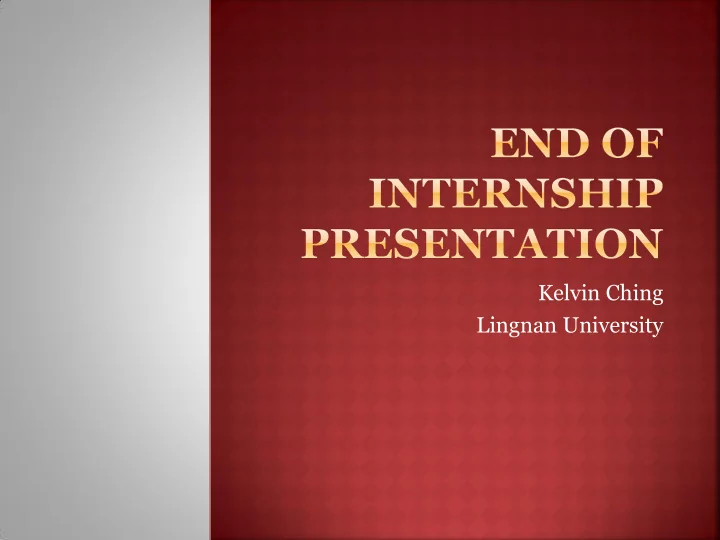

Kelvin Ching Lingnan University
2 nd Time to PRIA Went to UK & Europe last year Major in Psychology, Minor in Philosophy, also studying Sociology Graduate next year
Visited BPSMV only How CE incentives are given and taken
Background of Visit & Research (5 mins) Research Findings (20 mins) BPSMV (10 mins) DEI (10 mins) Personal Reflection (5 mins)
Two companion New research on University-Community Relations (UCR) More school visits (BPSMV again & DEI)
Overview of CE activities Vision of Institution Nature of activities (Illustrative Forms of CE) Brief Evaluation with respect to UCR
Interview with School Management Staff 1. Field Observation 2. Interview with Community Members 3. Interview with Students 4.
Girls’ School (1-12) BPSMV Co-ed School (KG-12)
Vice Chancellor’s Office Student Welfare Office Language Centre Social Work Department Economics Department Ayurveda Department and Clinics CSUIR English Department Law Department Polytechnic Institute
Women Empowerment through Community Engagement Contribute to social development to gain Trust Relationship with Communities Awareness of Needs and Opportunities in communities Employability Contribute to Society Enter Social System Financial Independence
Service 1. Research 2. Knowledge Exchange 3. University Courses 4. Practical Training 5. Student Initiative 6. From PRIA’s Occasional Paper
Department Project(s) Form of Engagement Language Centre Training Local School Teachers 1/4 Social Work SHG, Sanitation 1,3,6 Economics Research on SHG 2 Ayurveda Clinic 1 Medical Camp 1 Questionnaire 5 Law Promotion of Rights 3
CSUIR Role of Centre = Coordinator Different type of courses offered (Certificate of Proficiency) Gather resources from multiple providers Involves multiple sectors (Govt, Business) Facilitate effective allocation of social resources.
Lack of information about government policies Lack of resources Lack of awareness of rights Cultural taboos Low employability, especially for the illiterate and the unskilled
Policy Makers Involvement Possible Community in Equal Partnership Occasional giving Active in communication Role of Students Significant Labour Continuity Relationship Building Conversion Social Sector Mobilize Social resources utilized
Resources Project Continuity Lack of Exposure Due to its Rural Location Most challenges overcome by CSUIR
Information and Resources are offered Identify needs Customize solutions Student initiatives Institutionalization addresses institutional needs Equal Partnership Projects involving students are more sustainable.
Feedback system Systemized mechanism of handling feedback from past participants Also involve students Peer teaching
Girls’ School DEI Boys’ Intermediate
Complete Man Intellect Morality Simple Lifestyle Encourages Labour and Student Initiatives
Registrar Music Drawing and Textile Economics Life-long Learning & Extension Home Sciences Commerce NSS Coordinator Community College Applied Rural Technologies Engineering Multimedia & English
Department Project Type FoE NSS Medical Camp Service 1 Coordinator Children Education Service 1 Social Awareness Service 3 LLL Village Adaptation Service 1 Drawing & Producing Uniform Work-based training 1,4 Textile Textile Course Distance Learning 4 Home Science Food Preservation WBT 1,3 Business Business Clinic WBT 3 Multimedia & Language Lab Service 4 English Learning Software Distance Learning 3 Engineering Village Internet Service 1
Income, Financial Independence Reduce waste Generate profit Make use of government schemes Employability
Engaged as families Educational facilities in medical camps allows parents to come with children Social Resources Utilized Students as Labour Students practice their skills Skills incorporated Sustainable
Lack of innovation from students Most projects are designed and led by teachers Objective not met Gives more than takes Communities are too weak to offer anything at the moment. Situation may improve once villages are empowered. Nonetheless, projects sustainable.
Skill and Resources are offered Identify needs Customize solutions Units work as one Without coordinator or institution All departments share same vision and cooperate well Lack of student initiatives Less equal partnership
Allow students to take up leading role Student involvement enhances sustainability Allow community members to contribute Stitching course & Food preservation are good work. (Questionnaire & peer teaching). Involves a third party (e.g. Institutionalization, BPSMV meeting village heads)
More interaction More sociable Coordinating 2 researches More thoughtful Exercise our beliefs and believe in what we do
Various projects in BPSMV and DEI Students’ active participation enhances the engagement quality of CE projects UCR more than dialectic
Recommend
More recommend